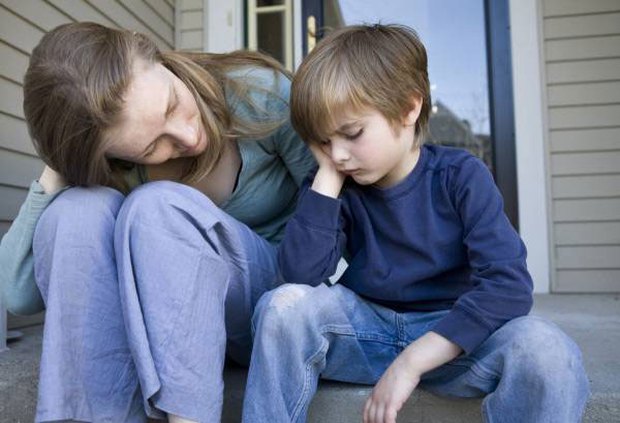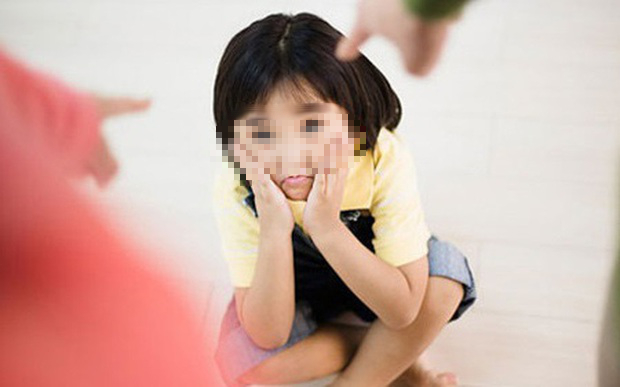During the journey from childhood to adulthood, for children, parents’ words are a light that lights up their children’s path. They can hurt children or encourage them to live happily and confidently.
Many people think that words are blown away by the wind, but remember, sometimes we adults can’t forget a hurtful sentence, whether unintentionally or intentionally? Physical wounds will have a day to heal, spiritual wounds sometimes stick around forever.
Even a common statement that seems safe can inadvertently tap into a child’s self-esteem and make them feel insecure.

Illustrations
1. “You are so talkative”
Young children are not good at controlling their emotions and actions. Sometimes, the times when children cry, get angry, make parents tired and upset. Many parents will say “you’re so talkative” as a way to ask your child to stay calm. However, psychologists believe that this way of saying will inadvertently reject the child’s true feelings.
Children often look to their parents to express and learn to manage their emotions. If parents think children’s emotions are silly, children will gradually disregard their own and others’ feelings and thoughts.
2. “You are so clumsy!”
When children are criticized, they only think of one thing, “I’m a bad person” and so, you have not given them a chance to change and become better. So, why should children be cleaner or more skillful? That’s the nature of it already.
3. “No big deal”
Children cry easily over seemingly silly things. However, despite being annoyed by the crying, parents Nor should the child’s feelings be dismissed by saying “it’s no big deal”.
The little problems and the emotions that come with them are very important to the child. According to parenting expert Amy McCready (USA), by saying “it’s no big deal”, parents will make their children understand that “my feelings don’t matter” or “it’s silly to be scared or frustrated”. .
Instead of denying your child’s feelings, take some time to try to understand things from the child’s point of view. Ms. McCready suggests that parents open up: “You seem very scared/disappointed/angry. Would you like to talk to us to find a solution?”. Thus, parents both help their children identify their emotions (an important part of the development of emotional intelligence – EQ) and show children that parents are always there for them.

Illustrations
4. “I’ll wait for my father/mother to come back and ask”
This is an irresponsible statement that parents often make when their children ask about a certain problem. The “lack of cooperation” from parents with children’s questions will gradually create a habit of making children withdraw, not wanting to talk to adults and find answers on their own.
This, if prolonged, will affect the psychology and development of the child’s future personality.
5. “Look at that family’s child”
Most people have more or less been compared to their children by their parents when they were children. This comparative psychology is a manifestation of parents’ desire for their children to become better, turning pride into a motivation to try harder. However, in practice this comparison is completely counterproductive.
Children always yearn for their parents to understand them and be recognized. The fact that parents say things that are contrary to their children’s thoughts make them feel abandoned.
Every child is a unique individual, no two are alike, the comparison is really lame. If parents want their children to become “other people’s children”, they must first become “other people’s parents”. If parents understand this problem, parents need to immediately stop blind comparisons, and pay more attention to their children’s feelings instead of grades.
6. I look exactly like my father/mother
Sayings like this are mostly caused by young parents having a disagreement with each other and then venting their anger on the child. This both makes the parent and the child feel offended.
At that time, the parent unwittingly pushed the child into a struggle to choose, either with the father or with the mother; In the case of divorced parents, the child’s feelings are even worse.
7. “I wish I never had a child”
Even if you’re disappointed with your children, don’t say you wish you never had them. Psychologist Karen R. Koenig said that she has met many cases where customers are traumatized for life because of this statement from their parents.
Ms. Koenig advises that when facing frustrating, unhappy things, parents need to create their own space to calm down before talking to their children, avoid saying hurtful words.

Illustrations
8. “You make your parents sad when you do that”
Of course, you will be disappointed if your child doesn’t listen. However, it’s important to set and maintain boundaries and not pour your feelings onto your child.
Not to mention, saying “you make your parents sad when you do” will give the child “negative power”. Specifically, if children know they have the ability to make their parents happy, sad, or angry, children will take advantage of opportunities to push adults to respond according to their wishes.
“And later as an adult, that mindset of the child will harm future relationships, making him a manipulator of others to get what he wants.”parenting expert Amy McCready (USA) warns.
at Blogtuan.info – Source: Soha.vn – Read the original article here



